THE UNIVERSE IN THE WORD
a poetry reading presented by Mercedes Minguela
attended by Norman Warwick
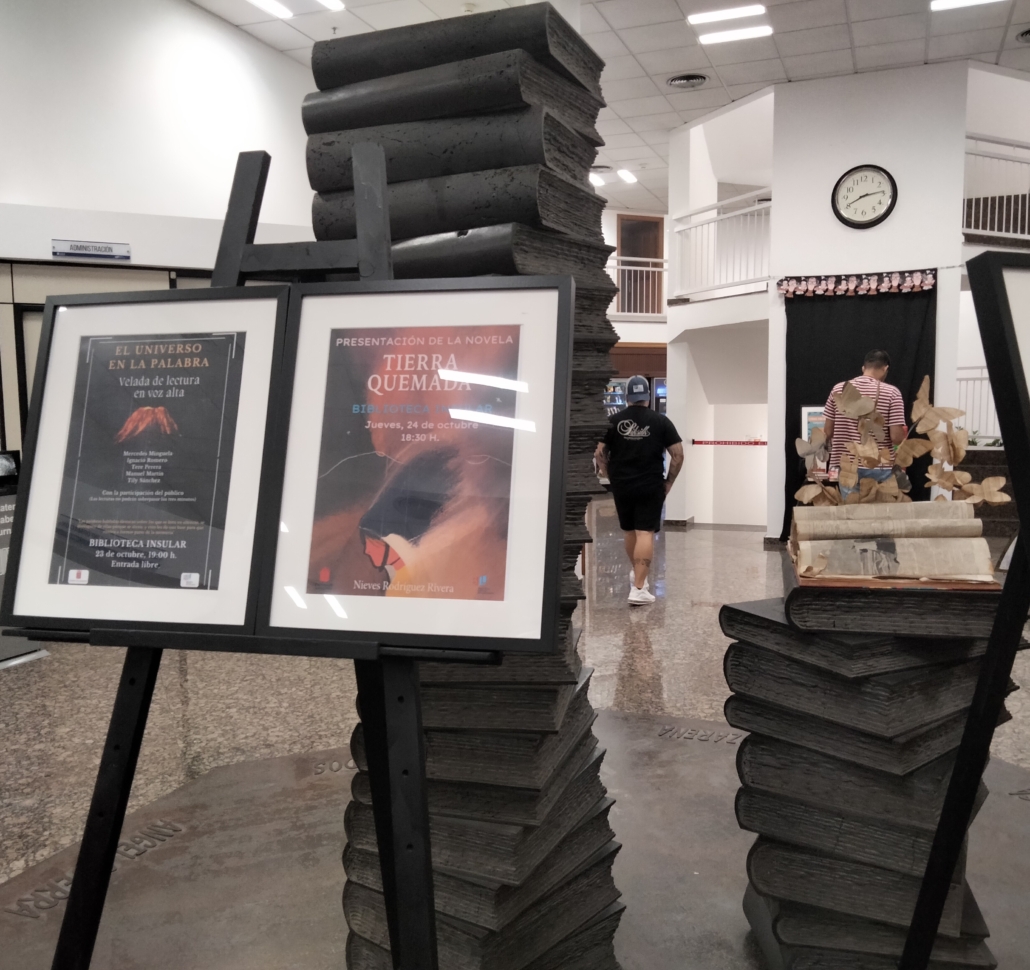
Today we continue our search for A Place For Poetry, and where better place to search than in a library? The Library in the centre of Arrecife is certainly a unique venue, with its portal which is entered between two sculpted pillars, maybe three metres high, of piles of huge encyclopaedic tomes. They seem to lean higgledy-piggledy (as all the best books do) and threaten to fall over and spill all their poems, prose and knowledge all over the floor, but the piles of books have survived and I know that in one of them their must be some information about why poems are so difficult to deal with in translation. Given that the poetry reading we were attending tonight was of a dozen or so excellent Canaria poets reading their words in Spanish…and me, reading my poem in Enlish.
Poetry is one of the most intimate, subjective, and creative forms of expression. As such, the ultimate goal of poetry translators is to convey the original poem’s intent, meaning, and style as faithfully as possible. In some cases, the task may sound impossible since the poems are complex in rhymes, meter, rhythm, metaphors, and many other factors that could pose various problems in translating poetry. Here are some typical challenges to anyone who dares to translate poems.
Rhyme
One of the major challenges is the devices and nuances that make poetry what it is. Nearly every culture has rhyming words that are put together in some form. Rhyme is catchy and lends a sense of wholesomeness to words that are strung together. However, the practical and critical task of a translator is how to keep the original meaning and expression but still can describe it with rhymes in the new language. To come up with a natural translation, translators will need to choose a corresponding syllable that can create a similar effect on the listeners.
Rhythm and meter
Rhythm in poetry is related to the matching number of syllables in each line and linguists have to find meaningful words that fit in terms of rhythm and rhyme. There is a high chance that a simple change in the meter can lead to adverse impacts on the flow of a poem, and to avoid such situations, translators will use their expertise to find a decent word that perfectly fits in the place. To capture all the meaning and expression of the original, the translator’s mind should be able to digest the source and produce the result that contains the equivalent structure.
Metaphors
One of the biggest problems when translating poetry is metaphors. Metaphors are specific to a particular language base on the culture, interests, behaviors, lifestyles, and many other factors. For this reason, they are not easy to be translated into a different language. For example, the phrase “as quick as a flash” cannot be literally translated, using a relevant alternative in the source languages would be a proper choice. Metaphors are capable of forming images and deliver underlying thoughts in the mind of readers; hence, translators also have to create the same effects for the new audience by using the target language. This adds an extra level of difficulty for translators as they have to be fluent in the target language, understand the culture, interests, behaviors, lifestyles, and various other elements to come up with the same impact.
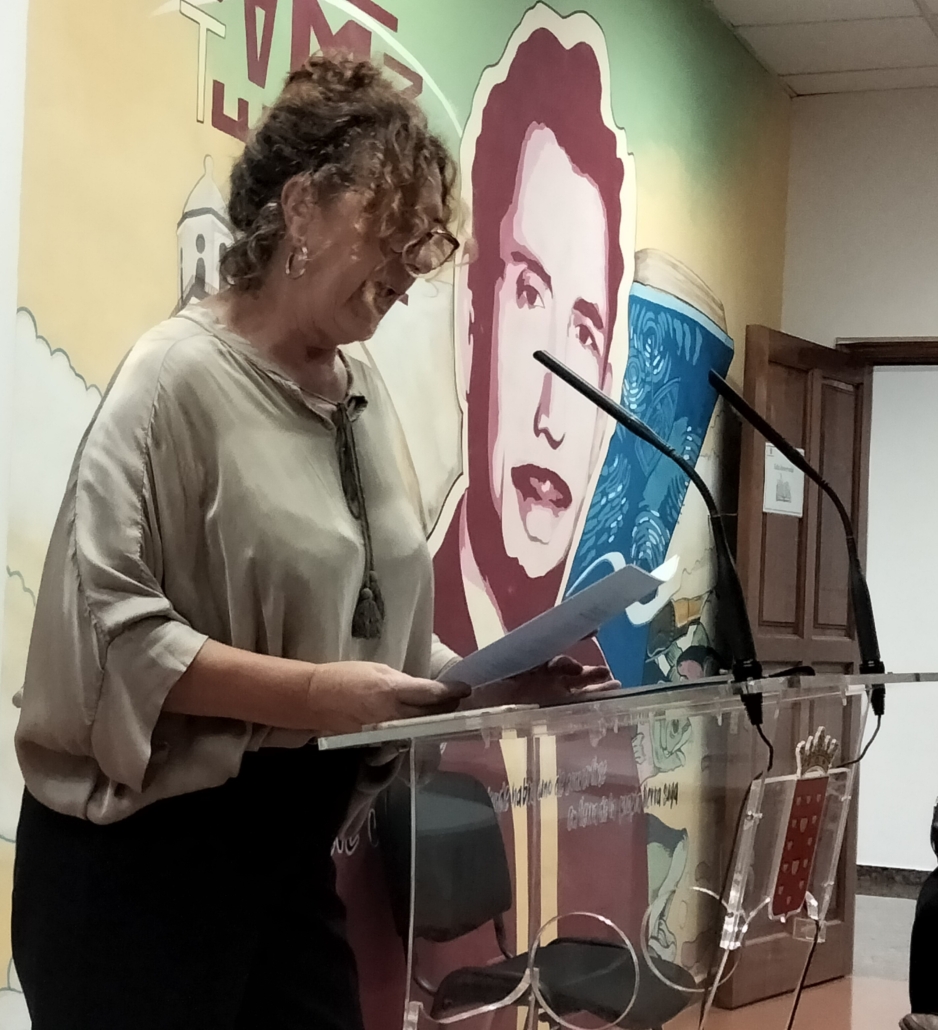
All this came to mind on the evening of Wednesday 23rd October when I attended a poetry reading event organised by the hard-working arts enthusiast Mercedes Minguela.(right) She understands how various art forms, including poetry, have the ability to create communities of tolerance and understanding. I used to organise similar events in the UK until I moved here to Lanzarote. However, that was then and this is now. Then the poems were in my own English language and now the poems are in Spanish.
Tonight all the poems read at the Central Biblioteca were in Spanish, except for my reading of my own poem, Where Imagination Begins, wrapped in a song by American writer Richard Dobson called So Have I.
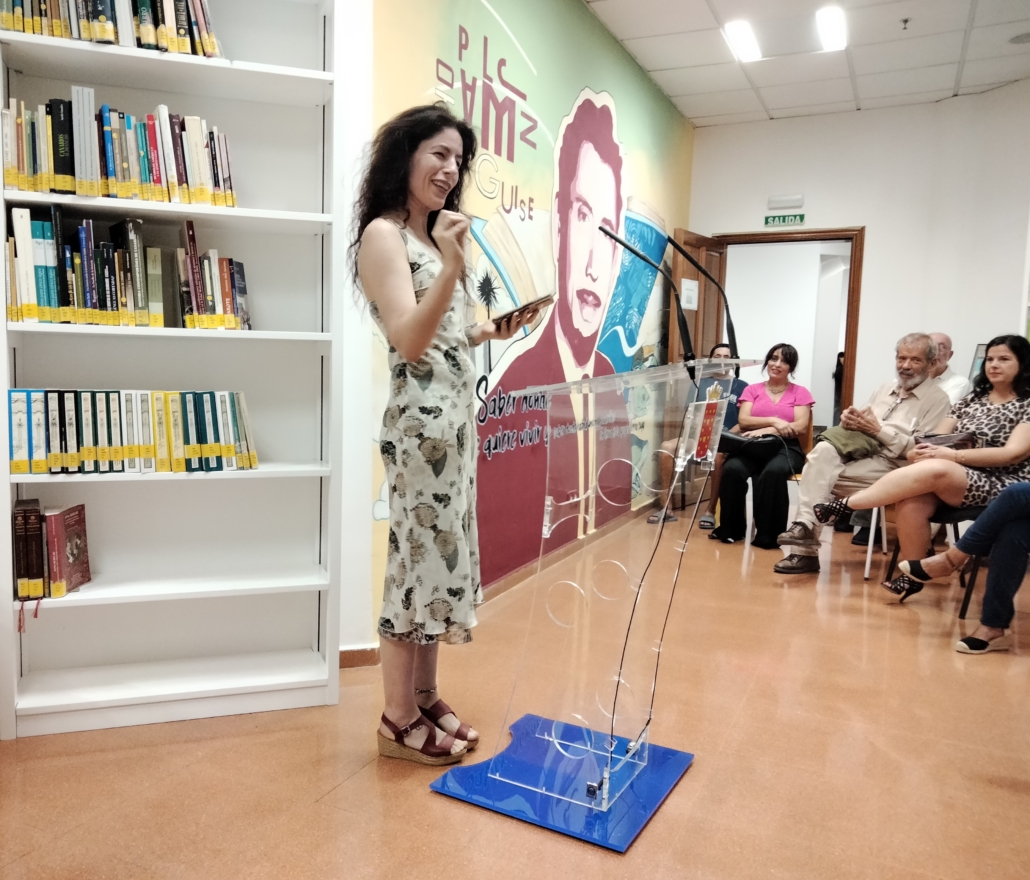
The Library is adjoined to a huge sports area between the UD Lanzarote football stadium and The El Salinero, named after the late poet, Victor Gopar. The library, (perhaps as are all libraries) is a magical, mystical place. This particular library, in Arrecife has twisting staircases and walkways or passages that disappear into the sports arena. There are huge floor to ceiling bookcases along most walls but it seems that one wall in every reading room has an intriguing mural daubed upon it, as you can see from our photographs.
As always at an event run by Mercedes the planning and preparation were meticulous. There was a neat podium with microphones installed, and she had invited several well known Lanzarote or Canarian readers to deliver a poem of their choice to reflect island life. She had publicised the event in all the right places to attract a good size audience and she was there at the door, ready to start welcoming her guests, fellow poets and audience members alike, long before starting time.
My wife Dee and I took front row seats, and all the other performers were similarly seated amongst the audience. So the whole evening was delivered in a delightfully informal but efficient manner that kept things running to time and kept the audience interested throughout.
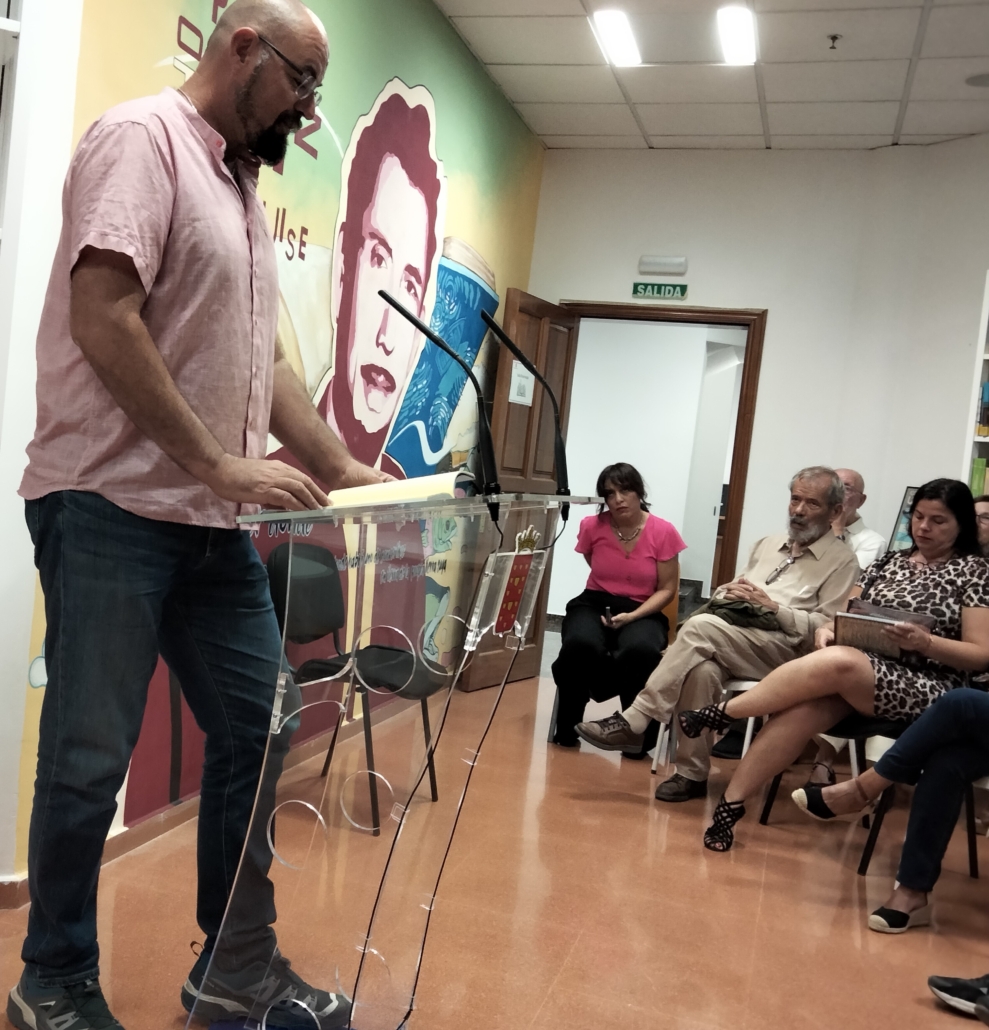
I noted, as I had on previous of occasions when attending these poetry events, that here the poems are (usually) read from a book and only (very occasionally) recited from memory. Each reader paid massive respect, both in the selection of and in the reading of a poem to fit the theme Mercedes had suggested of reflecting life on the island(s). There is very little of the performance poetry element that has eaten into poetry readings in the UK over the past thirty years.
Tonight was tangibñy about shared thoughts.
Mercedes, of course spoke in Spanish when introducing each reader to the podium and giving a potted biography of each as she did so. It seemed like she knew personally everybody in the room, and it seemed that all the writers in the room, the special guests Mercededes had invited and those who turned up to listen and perhaps participate too, know and respected each other. It was a smiles and hugs kind of night, with the members of the media covering the event being as unobtrusive as possible as they took their photogrpahs.
I have lived on Lanzarote for ten years now and have attended a couple of events like this every year and have learned to identify the rhyming schemes and the rhythm and the meter of the poetry, but find it difficult, obviously to unpick the metaphors and the allegories etc.
Nevertheless, I can tell you that of the poems delivered a sincere gratitude for the life style we enjoy of sun, sea and sand here on the island. I am also convinced that I can hear in the island´s poetry a reflection of the stoicism of an island people who have re-built from the desolation caused by volcanic eruptions of the mid seventeen hundreds.
In fact, the reader shown right, actually employed a phrase that translated from Spanish to English as ´poetry is a room of contemplation.´
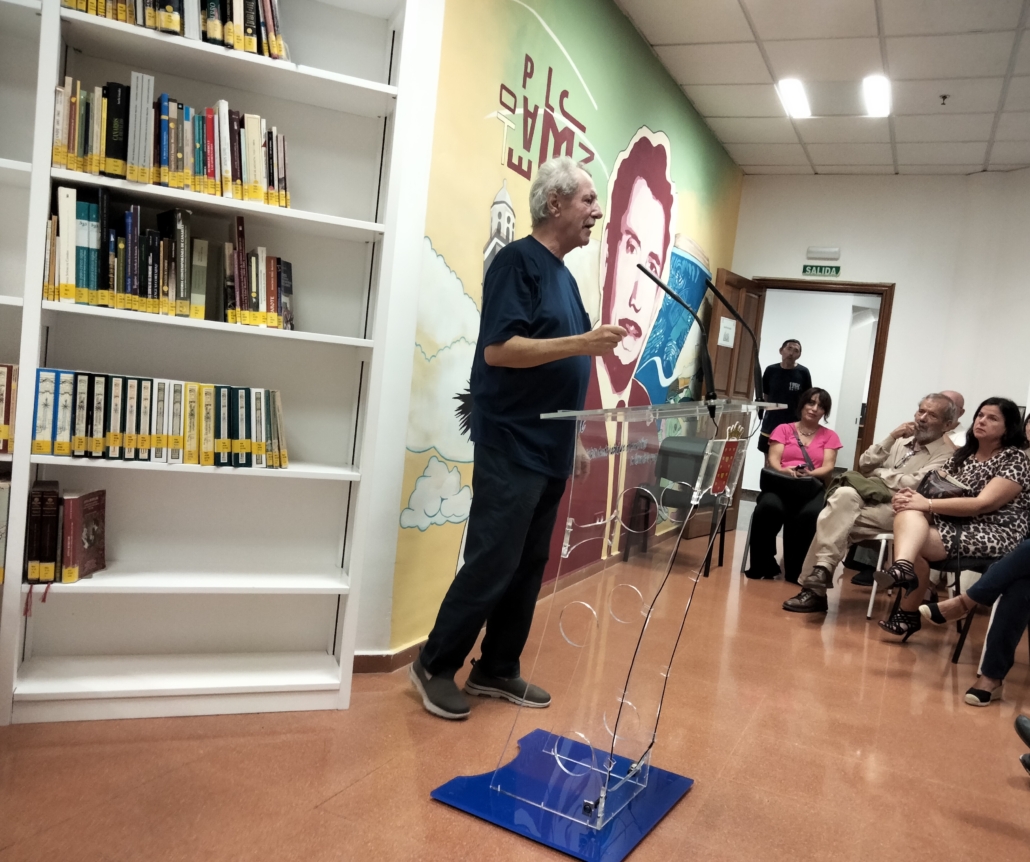
As I began my own reading (left) I apologised with a lo siento that I cannot speak Spanish, and asked if anyone in the room spoke English. Only a couple of hands were raised, so I told them, in English, that I would try to convey my poem not only vocally, but also visually in a manner that is now called ´performance poetry´ in the UK.
The seating was arranged ´up close and personal´ so I could clearly see the looks of amazement and amusement and bemusement when I told my story of how we enjoy simple pleasures here on Lanzarote. When I spoke of watching a bird on high circling around in a clear blue sky I flapped my arms like wings and spun around slowly as I spoke. When I spoke in the next verse of laying out at night in my own backyard to count the stars I pointed with my finger up to the constellations and when I closed with a final verse about the somehow guilty pleasure of hearing music in my head and dancing alone in an empty room, I waltzed around the floor.
I closed by explaining that once, when I was ´teaching´ poetry in a school in the UK, I wrote the word IMAGINATION on the board and asked a class of eleven year olds where imagination begins. After we had exhausted some twenty or so suggestions, one lad finally shouted out in triumph and pointed at the chalked word.
“Sir, Imagination begins with I.”
“Do you mean I, or eye?”
“Oh, come on sir, —- your messing with my head !”
Mercedes has an ambition to create a major festival that would see these Spanish readers working alongside translators and poets from our other national communities. This could see such poetry read in its original language and then in translation. Such a festival could perhaps include workshops in Spanish poetry, English poetry and German, French, Dutch, and Italian poetry. Mercedes is sure that such an event could lead to collaboration and sharing, two words that exemplify what Lanzarote is all about.
We´ll bring you news of such an event as soon as it becomes finalised for the calendar.
.
i
i

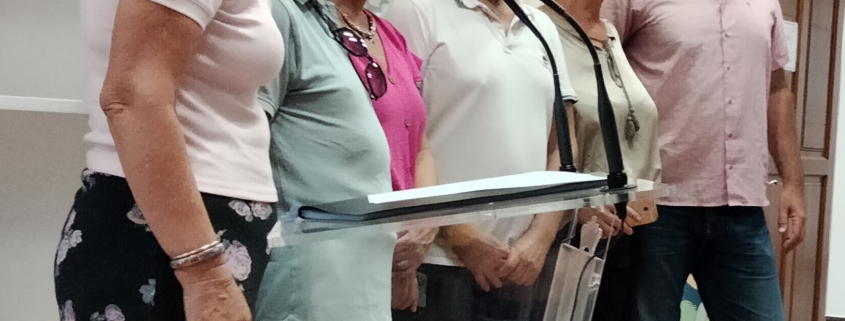


Leave a Reply
Want to join the discussion?Feel free to contribute!